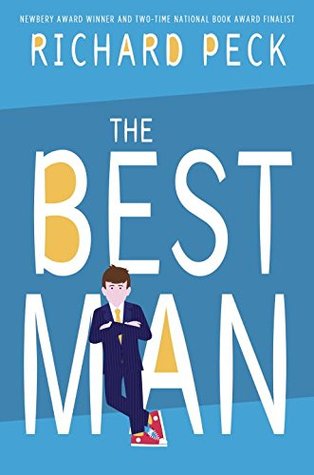The Best Man - Richard Peck
When Archer is in sixth grade, his beloved uncle Paul marries another man—Archer’s favorite student teacher. But that’s getting ahead of the story, and a wonderful story it is. In Archer’s sweetly naïve but observant voice, his life through elementary school is recounted: the outspoken, ever-loyal friends he makes, the teachers who blunder or inspire, and the family members who serve as his role models. From one exhilarating, unexpected episode to another, Archer’s story rolls along as he puzzles over the people in his life and the kind of person he wants to become…and manages to help his uncle become his best self as well.
This is a very interesting book, and one that brings up some great points about how queerness and same-sex marriage affect young people who may or may not actually be understanding themselves in terms of sexual identity or gender identity. I do, however, wonder if people are having their opinions of the book affected by their love of Richard Peck. I do like Peck's work a lot, but this, in my opinion, is not his best work.
The issues are interesting and speaks somewhat to very current sociopolitical happenings regarding marriage and civil unions and recognition of same-sex marriage. That being said, the child characters feel much too mature. And though Peck attempts to explain this through giftedness in a number of cases cases, it feels like an unsatisfying explanation. The other thing is that while the book is set up as being about marriage, marriage is so peripheral that I wonder about its effectiveness as a catalyst. There is also a character who is tied up in a bathroom with GAY written on his forehead, and the event only serves to allow one of the adult characters to come out.
I am also concerned about the treatment of disability, and the reasons for including the British highbrow society people for that matter, except as a very strange way of creating an event for the culmination of various unresolved plot lines. It felt a bit sloppy, if I'm being honest, and part of that might have to do with the quick turnaround of the novel, especially considering it barely took two years (a short time in publishing!) for the novel to be released into the world.
I am also concerned about the treatment of disability, and the reasons for including the British highbrow society people for that matter, except as a very strange way of creating an event for the culmination of various unresolved plot lines. It felt a bit sloppy, if I'm being honest, and part of that might have to do with the quick turnaround of the novel, especially considering it barely took two years (a short time in publishing!) for the novel to be released into the world.
So, while I liked the story and found a lot to enjoy, I had some significant problems overall, and feel that it would be best read and explored by parent-child reading experiences, allowing young readers to ask questions and give parents the opportunity to further expand on some of the issues above (what to do about bullying, etc.)
Recommended (with reservations)
(NOTE: This review is from an Advance Reading Copy - Out Sept. 20, 2016)

It's interesting--I liked this book much more than the other books by Peck which I've read. I could clearly imagine a few very snarky 5th graders in my classes saying exactly the same things. I found the main character very believable and not too wise or adult in observations.
ReplyDeleteI am wondering more about the treatment of disability, even if temporary--that seems more a plot device than a well-rounded character. I think you raise very good points about the convenience of tying up loose ends with the culminating party. Thank you for prompting me to think a little more deeply about this story.
I think that parents should expand on any questions the kids have.
ReplyDelete